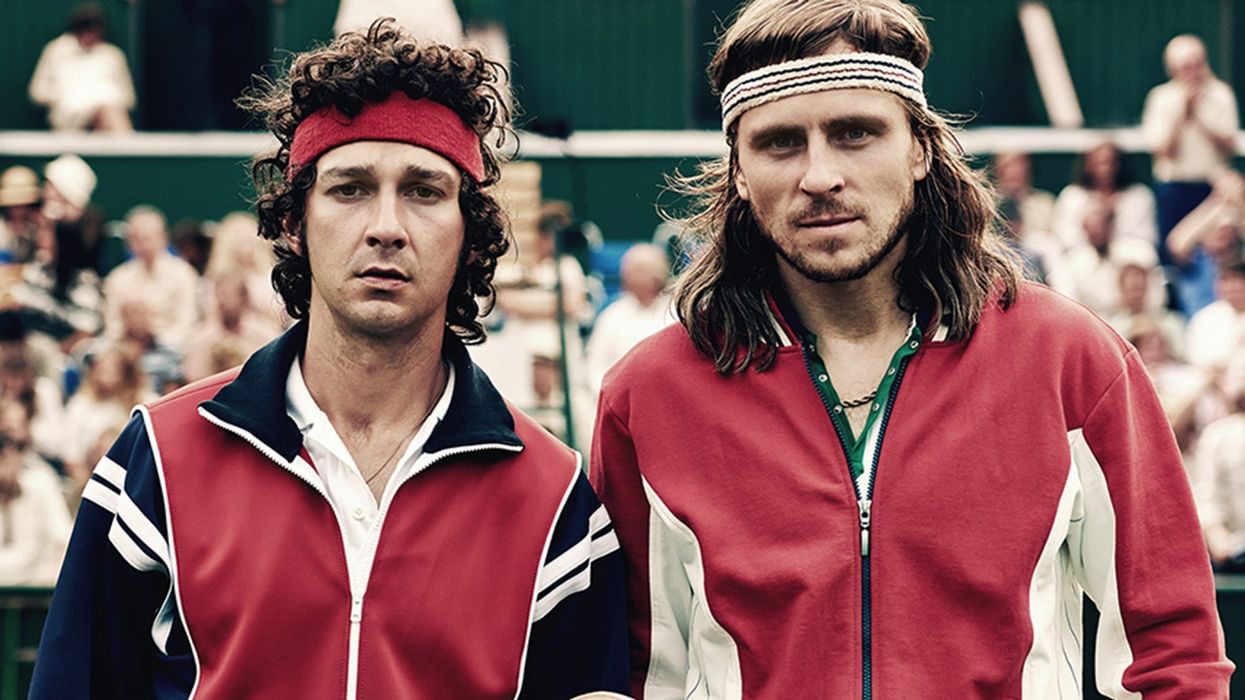'Borg/McEnroe': Transforming the Great Tennis Rivalry into a 'Psychological Thriller'
TIFF kicked off yesterday and the talent behind Borg/McEnroe sat down to discuss how the film is about far more than just a game.

Danish filmmaker Janus Metz, who made his feature debut with the acclaimed 2010 doc Armadillo, is making his first foray into fictional films, though this one is based on a real-life, world-famous rivalry that changed the sports world in the 1980s. Borg/McEnroe chronicles how in the early 1980s, tennis was changed forever by the rivalry between Björn Borg and brash American upstart John McEnroe, who became infamous for his temper (and acted as an indirect inspiration to filmmaker Wes Anderson.)
But the director said that his film, scripted by Ronnie Sandahl (Underdog) was not just the story of a sports rivalry. According to Metz, "it doesn't make sense to make a sports movie...unless you have a story," and while the tennis "had to sell" on screen, as a director he approached the film as a "psychological thriller," albeit one that was played out (at least in part) before millions of people, in this case at Wimbledon in 1980.
The film, which stars Swedish actor Sverrir Gudnason as Borg and American Shia LeBeouf as McEnroe, explores the psychology of two men who, though they were perceived differently on the world stage, had more in common than their need to defeat the other. Borg, who Gudnason described as a "rock star" and "revered" figure in Sweden when he was growing up, had a reputation for cool, cerebral play. On the other hand, McEnroe, who grew up in Queens, was considered a hothead, pushed by a competitive working class family into intense academic and physical competition, and rose through elite private schools to bring his brash sensibility (and new life) to what had been one of the more genteel sports.
The two actors, neither of whom had played tennis with any seriousness before the production, spent roughly half a year training, and Metz said that he used all of the "magic tricks in our bag of moviemaking" to enhance the drama, acknowledging the need for the two to appear as convincing as possible while portraying two of the top athletes on earth (they also discussed the impeccable 80s fashion used for the characters to capture the era). As for playing real life characters, Stellan Skarsgård, who plays Lennart Bergelin, Borg's late coach, revealed that he had placed a call to the coach's widow, and she had approved, telling him it was only a movie.
"It doesn't make sense to make a sports movie...unless you have a story."
Asked about the similarities between athletics and acting, insofar as both require a great deal of preparation but neither leave any room for contemplation, Skarsgård revealed that in his opinion, "you can think, but in front of the camera, it doesn't help," adding that, "there's a lot of really, really good actors who are really stupid," and that as far as he was concerned, "thought blocks flow...you've got to be there on instinct, more than thought."

For his part, LeBeouf is now a McEnroe expert and apologist, arguing that the player was really more angry with himself than anyone else, revealing how the film explores this dimension. Metz added that he was only interested in making films that had a statement to make "about a piece of reality," calling the story of the two champions "a prism [through] which we are looking at a specific incident in time," and a way to make intensity of the athlete's existence into a "public truth."
One hidden dimension the film explores is Borg's inner turmoil. Revered for his icy exterior, the film reveals that Borg comes from a similar background as McEnroe, growing up in a poor part of Sweden, a dimension unknown to many outsiders. Metz discussed how this led the film into issues of the two countries during the players' youths, comparing the Swedish "welfare" state with the "capitalist" U.S. Check out this clip, from a McEnroe-Borg match, in which Borg pulls a McEnroe and has a discussion with a line umpire, and see not only Borg's out of character behavior (he still is really chill, to be fair), but also how the filmmakers matched the 1980s aesthetic, from TV broadcasting to fashion and every little detail that counts in a historical film, down to the headbands.
Tennis, with its emphasis on the individual battle of two players, modern gladiators surrounded by an audience, and its extreme pressure to make it to the top, has served as a foil for art before, playing a huge part in David Foster Wallace's classic novel Infinite Jest, where the game is a metaphor for, well, everything, pretty much. Metz and his stars feel that the game was the perfect venue to explore the psychology of not just competition, but fame, and the story behind the shallow public perception of sports celebrities.
Just released in Sweden, audiences in the US will have a chance to judge for themselves how well Metz and Co. accomplished their objective when the film opens this fall. In the meantime, you can get ready by watching this recap of their famous 1980 Wimbledon match.
Featured image courtesy of TIFF.
Source: TIFF











